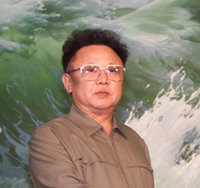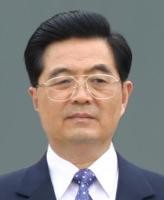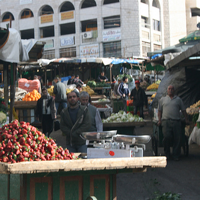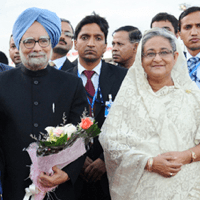Indian and Mongolian troops are currently holding a two-week military exercise in Mongolia, following a visit by the Indian army chief to the Central Asian country. In an email interview, Sharad K. Soni, an assistant professor of Mongolian and Central Asian studies at the School of International Studies at Jawaharlal Nehru University, discussed India-Mongolia relations. WPR: What is the recent history of India-Mongolia relations? Sharad K. Soni: The two countries, known as “spiritual” neighbors, have been in close contact not only on the basis of their historical relationship, but also on the basis of post-Cold War realities. The Treaty of […]
Economics & Business Archive
Free Newsletter

This is the second of a two-part series examining the policies and political challenges facing the new government of Thai Prime Minister Yingluck Shinawatra. Part I examined domestic issues. Part II examines foreign policy and the implications for regional stability. With its domestic opponents watching closely for missteps, the government of Thailand’s recently elected prime minister, Yingluck Shinawatra, will have to tread extremely carefully in matters of foreign policy. The mishandling of relations with Cambodia by the administration of Yingluck’s predecessor, former Prime Minister Abhisit Vejjajiva, had resulted in border skirmishes that killed 28 people this year alone. Yingluck’s Pheu […]
British Prime Minister David Cameron visited Moscow last week, where he met with Russian President, Dmitry Medvedev and Prime Minister Vladimir Putin. In an email interview, Edwin Bacon, a reader in comparative politics at the University of London, Birkbeck, discussed U.K.-Russia relations. WPR: What has been the nature of U.K.-Russian trade and diplomatic relations from the post-Cold War period until today? Edwin Bacon: In the immediate post-Cold War years, U.K.-Russian relations flourished, marked by reciprocal state visits in 1994 and 2003. When Vladimir Putin became Russia’s president in 2000, he singled out the U.K. as a key European partner. The […]

Editor’s note: This is the first of a two-part series examining the policies and political challenges facing the new government of Thai Prime Minister Yingluck Shinawatra. Part I examines domestic issues. Part II will examine foreign policy and the implications for regional stability. CHIANG MAI — Weeks into Yingluck Shinawatra’s term as Thailand’s first female prime minister, the streets of Bangkok are so far free of the protests that have indelibly marked recent years of Thai political life. But that could change. Yingluck’s government faces formidable challenges in implementing the ambitious platform that brought her Pheu Thai Party a sweeping […]

Last week, WPR’s Judah Grunstein noted some interesting developments in Russia-Korea relations. These included North Korean leader Kim Jong Il’s conferring with President Dmitry Medvedev and other Russian leaders in a rare visit to Russia in August; the signing of a Memorandum of Understanding regarding construction of a gas pipeline connecting Russia to South Korea via North Korea; the launching of a rail link between Russia and the North Korean port of Rajin; and plans to conduct a joint maritime search-and-rescue exercise in 2012. These developments have highlighted Moscow’s desire to play a major role in the future of the […]

BEIJING — Hamstrung by domestic sensitivities and an inadequate institutional framework for managing its proliferating overseas interests, China has found itself behind the curve on Libya. Beijing’s response has revealed the disparate interest groups within its foreign policy apparatus and the challenges it faces when responding to international events. Despite previous progress, China’s foreign policy apparatus needs to become more adroit at public positioning and more discrete and institutionally consistent in its private diplomacy to secure its international rise. Last Monday,* Beijing became the last major economic power to recognize Libya’s National Transitional Council (NTC), 10 days after Russia did […]
It looks like North Korean leader Kim Jong Il’s August meeting with Russian President Dmitry Medvedev was a productive one. This week has seen the announcement of a number of modest but significant initiatives with the potential to create lasting ties between the two countries. Most important is the signing of a Memorandum of Understanding between Gazprom and the North Korean Oil Ministry for the construction of a gas pipeline linking Russian supplies to South Korea. (Separate but coordinated discussions were held with the head of South Korea’s state-run gas company as well.) Also, a rail link between a Russian […]
Last month, Honduras deployed soldiers and police to the province of Colón to quell a series of deadly clashes over land disputes. In an email interview, Orlando J. Pérez, a professor of political science at Central Michigan University, discussed Honduras’ land disputes. WPR: What is the historical background of land ownership and land disputes in Honduras? Orlando J. Pérez: Conflicts over land are common in Honduras, with increased conflict since 2008. Land disputes are a symptom of the broader political, social and economic crises facing Honduras. They reflect the highly unequal nature of the country’s economy and represent yet more […]

It’s happening again. International credit markets are showing signs of strain; economic growth around the world is stalling; and there are growing fears the global economy could slip back into a recession. Last Friday, amid this unfolding financial turmoil, the Group of Seven (G-7) finance ministers met in Marseille, France. Despite calls from the International Monetary Fund (IMF) for the group to “act now — and act boldly,” the summit ended without any concrete plan of action. Indeed, the finance ministers could barely even muster a short communique. This contrasts starkly with how the world’s leading economies reacted to similar, […]

Later this month, the Palestine Liberation Organization is expected to call upon the United Nations to recognize Palestinian statehood based on the 1967 borders. The initiative is not based on any hope that the move will itself bring about a concrete change in conditions in the occupied Palestinian territories. Rather, it is intended to more firmly anchor the principle of a Palestinian state, at a time when Palestinian leaders fundamentally doubt Israel’s commitment to a two-state solution. The move is vehemently opposed by Israel, with Prime Minister Benjamin Netanyahu arguing that the effort seeks to circumvent the peace process. U.N. […]

Indian Prime Minister Manmohan Singh’s recent two-day state visit to Bangladesh has been pathbreaking in more ways than one. Not only is Singh’s visit to Dhaka the first by an Indian prime minister since 1999, Singh is the first prime minister from India’s 126-year-old Congress party to visit his country’s eastern neighbor in nearly 40 years. Bangladesh, formerly East Pakistan, won independence in 1971 with Indian military help. But relations between the two South Asian nations have since been bedeviled by mutual mistrust and border clashes that have thwarted any attempts at substantive commercial or political engagement. Until recently, New […]
In August 2009, Palestinian Prime Minister Salam Fayyad pledged to “complete the process of building institutions of the independent State of Palestine in order to establish a de facto state apparatus within the next two years.” The Palestinian Authority (PA), he said, would do this “despite the hostile occupation regime.” Indeed, Fayyad argued that by focusing on building institutions, Palestinians would “expedite the end of the occupation,” because their state would “emerge as a fact that cannot be ignored.” Fayyad’s two-year deadline expired in August 2011. Is Palestine ready, in institutional terms, for statehood? The question may appear hypothetical because […]

The 10th anniversary of the Sept. 11 terrorist attacks has garnered America almost as much schadenfreude from the world as the original events did. Back in 2001, the line was that we had it coming to us for lording it over the world since the Cold War’s end. Today, it takes the form of writing off our alleged “hegemony” in light of the shifts in global power over the intervening decade, a claim that is as absurd the previous one was insulting. Naturally, the Chinese are celebrated as our presumed replacement. So, as always throughout our history as a superpower, […]
Mozambique recently offered Brazilian farmers 15 million acres of farmland at a symbolic price to be used for the production of soy, corn and cotton. In an email interview, Adriana de Queiroz, an executive coordinator at the Brazilian Center for International Relations (CEBRI) who writes in a personal capacity, discussed Brazil-Africa relations. WPR: What are the main countries and sectors for Brazilian investment in Africa? Adriana De Queiroz: Brazilian companies have been investing mainly in mining, infrastructure and oil and gas in Africa. A significant proportion of this investment has been in Portuguese-speaking countries, such as Angola and Mozambique. Brazilian […]
